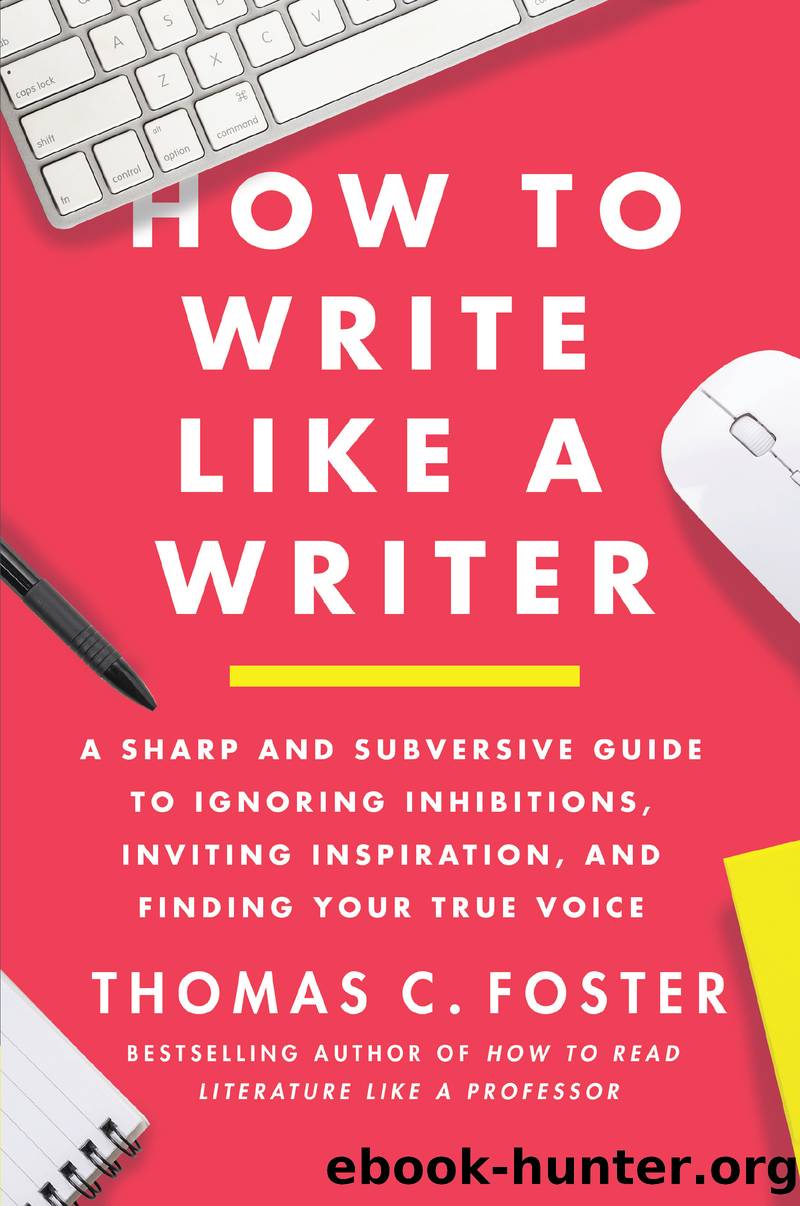How to Write Like a Writer by Thomas C. Foster

Author:Thomas C. Foster
Language: eng
Format: epub
Publisher: HarperCollins
Published: 2022-06-29T00:00:00+00:00
11
Endings
The perfect ending should take the reader slightly by surprise and yet seem exactly right to him. He didnât expect the article to end so soon, or so abruptly, or to say what it did. But he knows it when he sees it. Like a good lead, it works.
âWILLIAM ZINSSER
A COUPLE OF CHAPTERS ago, I gave you a reason that writing endings can be a drag. Hereâs another: by the time some of us reach that stage, we kind of lose interest. The heavy lifting was done earlier. As I mentioned, I always worked so hard on writing introductions in college that, when the time came to wrap up, I was exhausted. And often out of time, with another paper to start. What wound up appended to my essays was perfunctory at best. Right: not a great role model.
Over the years, I came to see that there was another thought hiding behind the tiredness: I felt like everything had been said and that the conclusion was self-evident. I just wanted to write a paragraph the entirety of which was âQEDâ for quod erat demonstrandum, meaning âwhich was to be demonstrated.â It wasnât true; nothing had been demonstrated. Oh, I had pursued my arguments to their last point. I had adduced evidence in support of my claims and explained how the two parts nestled together. I had done everything. Except finish the bloody thing. In retrospect, I see that my conduct was not only self-defeating, it was rude to readers. Having demanded their attention for a number of pages, I owed them a debt that could only be repaid by bringing those pages to a satisfying ending so that the matter did indeed feel demonstrated.
It is worth remembering that everybody, absolutely everybody, has trouble with endings. Poets, essayists, biographers, historians, novelists. Especially novelists. Here is one of the greats, E. M. Forster, on the difficulty of tying off a novel: âIn the losing battle that the plot fights with the characters, it often takes a cowardly revenge. Nearly all novels are feeble at the end. This is because the plot requires to be wound upâ (Aspects of the Novel, 1927). Perfectly good characters, even excellent ones, are sacrificed at the altar of getting the writer out of the blasted book. Think of poor Huck Finn once Tom Sawyer shows up to torment Jim and wreck everything the book has been teaching us for so long. Short stories are easier to end, since there isnât time for the plot to ball itself up into a Gordian knot. Story endings are almost always cleaner and more satisfying than those of their longer kin.
Historians and biographers may have it slightly easier. Lives, like historical events and eras, end. A chronological endpoint, however, is not the same as a narrative one, and even they must craft an intellectually satisfying finish to this narrative they have created over many, many pages. But they have to do so while limited by those tricky devils, facts. And poets
Download
This site does not store any files on its server. We only index and link to content provided by other sites. Please contact the content providers to delete copyright contents if any and email us, we'll remove relevant links or contents immediately.
Zero to IPO: Over $1 Trillion of Actionable Advice from the World's Most Successful Entrepreneurs by Frederic Kerrest(4573)
Machine Learning at Scale with H2O by Gregory Keys | David Whiting(4313)
Never by Ken Follett(3957)
Harry Potter and the Goblet Of Fire by J.K. Rowling(3858)
Ogilvy on Advertising by David Ogilvy(3622)
Shadow of Night by Deborah Harkness(3368)
The Man Who Died Twice by Richard Osman(3080)
Book of Life by Deborah Harkness(2939)
The Tipping Point by Malcolm Gladwell(2925)
Will by Will Smith(2920)
Purple Hibiscus by Chimamanda Ngozi Adichie(2855)
0041152001443424520 .pdf by Unknown(2846)
My Brilliant Friend by Elena Ferrante(2831)
How Proust Can Change Your Life by Alain De Botton(2814)
How to Pay Zero Taxes, 2018 by Jeff A. Schnepper(2655)
Hooked: A Dark, Contemporary Romance (Never After Series) by Emily McIntire(2555)
Rationality by Steven Pinker(2366)
Can't Hurt Me: Master Your Mind and Defy the Odds - Clean Edition by David Goggins(2342)
Borders by unknow(2315)
